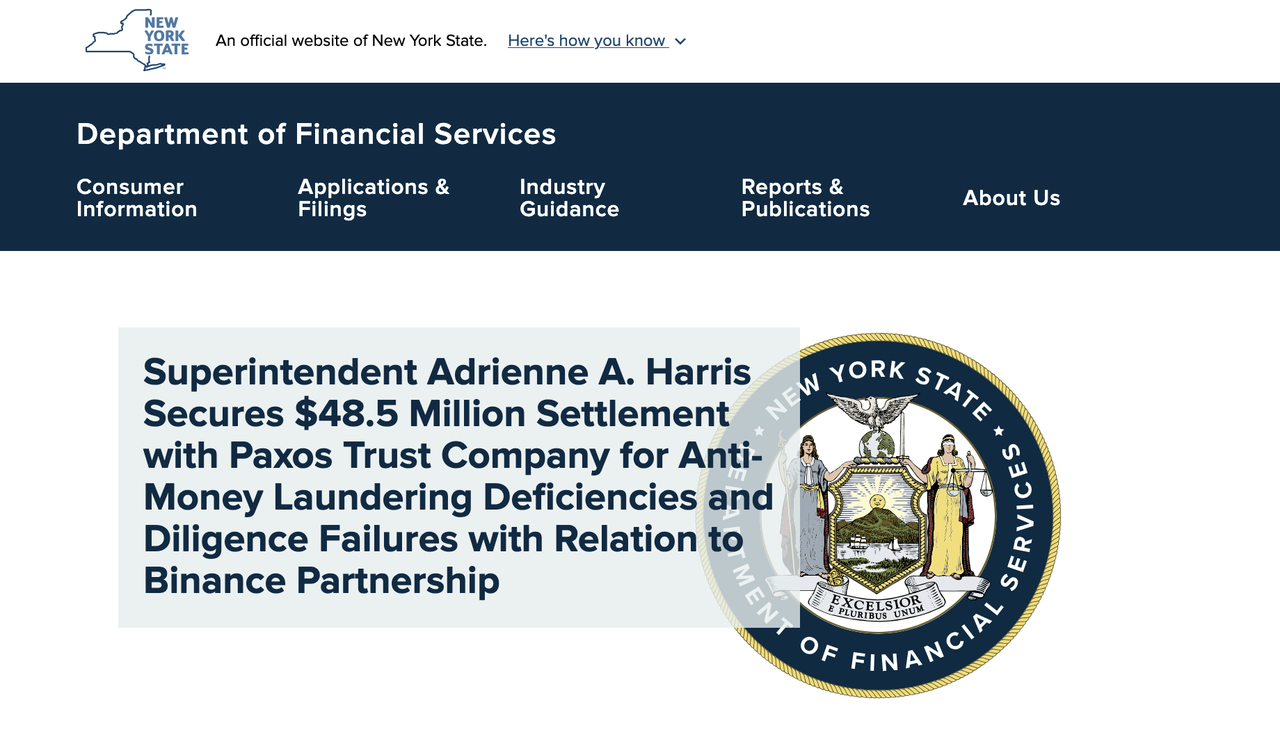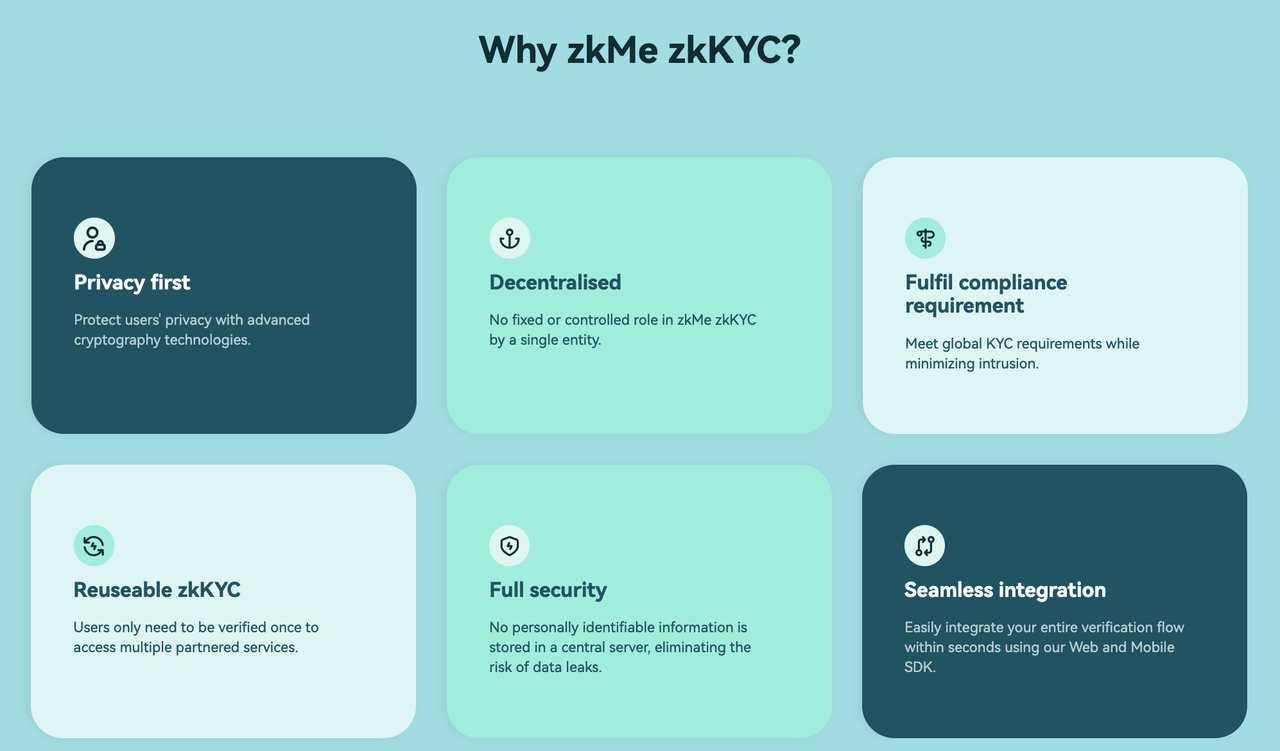In a landmark enforcement action that sent shockwaves through the stablecoin industry, New York's Department of Financial Services (DFS) imposed a staggering $48.5 million settlement on Paxos Trust Company for anti-money laundering deficiencies and due diligence failures related to its partnership with Binance. The penalty—comprising a $26.5 million fine plus an additional $22 million investment in compliance infrastructure—represents one of the most significant regulatory actions against a stablecoin issuer to date.
The case reveals a troubling reality: Paxos, despite being a regulated trust company authorized to engage in virtual currency business since 2015, failed to implement adequate controls to monitor illicit activity flowing through its partner network. Most damaging was the revelation that between 2017 and 2022, $1.6 billion in transactions involving illicit actors flowed through the Binance platform—transactions that Paxos's deficient compliance systems failed to detect or prevent.
This enforcement action culminated in DFS ordering the cessation of BUSD minting in February 2023, making it the first regulator globally to address safety and soundness concerns related to Binance. The message is clear: traditional compliance approaches are not only inadequate but potentially catastrophic for stablecoin operations in today's regulatory environment.
The Compliance Crisis Facing Stablecoin Distributors
The Paxos case exposes critical vulnerabilities in how stablecoin distributors approach compliance, particularly in managing third-party relationships and monitoring cross-platform activities. The investigation revealed systemic failures that should serve as a warning to the entire industry:
Inadequate Partner Due Diligence: Paxos failed to conduct sufficient ongoing due diligence of Binance, despite clear regulatory requirements and mounting red flags about the exchange's operations.
Deficient Transaction Monitoring: The company's unsophisticated monitoring systems couldn't detect obvious patterns of money laundering, allowing customers to open multiple accounts using shared addresses and documentation.
Reactive Rather Than Proactive Compliance: Without defined guidelines for investigating law enforcement requests, Paxos struggled to identify bad actors on its platform proactively.
Fragmented Risk Management: The inability to effectively monitor activities across partner networks created blind spots that regulators found unacceptable.

These failures highlight a fundamental problem: traditional KYC and AML systems, designed for centralized financial institutions, are ill-equipped to handle the complexities of blockchain-based financial services and multi-party ecosystems.
Why Traditional Compliance Systems Fall Short in DeFi
The stablecoin ecosystem presents unique challenges that traditional compliance frameworks struggle to address:
Multi-Platform Complexity: Unlike traditional banking relationships, stablecoin users interact across multiple platforms, exchanges, and protocols, making it difficult to maintain comprehensive oversight using conventional methods.
Privacy vs. Compliance Trade-offs: Current systems often require extensive data collection and storage, creating privacy concerns and potential security vulnerabilities while still failing to provide adequate compliance coverage.
Scalability Issues: As stablecoin adoption grows, traditional KYC processes become increasingly expensive and operationally burdensome, creating incentives to cut corners or implement inadequate solutions.
Decentralization Conflicts: The decentralized nature of blockchain technology conflicts with centralized compliance approaches, forcing uncomfortable compromises that satisfy neither regulatory requirements nor user expectations.
zkKYC: The Privacy-First Solution for Stablecoin Compliance
zkMe's zkKYC solution offers a revolutionary approach that addresses the core challenges revealed by the Paxos case while maintaining the privacy and decentralization principles that make blockchain technology compelling.
- Credential Verification: Users submit identity documentation to zkKYC issuers for verification through OCR and facial recognition checks, with no human interaction required.
- Screening & Risk Assessment: User identity is screened in real-time against PEP and sanctions lists, with risk profiles generated while actively scrubbing private data from memory.
- ZKP Generation: Anonymous verifiable presentation (VP) claims are issued in the form of Soul Bound Tokens (SBT) and Zero-Knowledge Proofs, stored on-chain and in decentralized storage respectively.
- Proof Verification: When accessing services, users provide ZKPs to verifiers who can confirm compliance without accessing underlying personal data, enabling seamless regulatory adherence.

How zkKYC Addresses Compliance Challenges
zkKYC technology directly addresses the types of compliance deficiencies identified in the Paxos case:
Cross-Platform Compliance Verification: zkKYC enables verification of user compliance status across partner networks without requiring direct access to personal data, addressing due diligence gaps between collaborating platforms.
Privacy-Preserving Transaction Monitoring: The system combines Know Your Transaction (KYT) capabilities with zero-knowledge proofs to detect suspicious activity patterns while maintaining user privacy, resolving the monitoring-privacy conflict.
Proactive Risk Management: zkKYC's real-time PEP and sanctions list screening, combined with continuous on-chain transaction monitoring, provides comprehensive risk assessment without storing sensitive personal data.
Regulatory Alignment: : zkMe is the world's first Web3-native identity verification solution compliant with FATF KYC and AML recommendations, enabling regulatory compliance while maintaining decentralization.
A Call to Action for the Stablecoin Industry
The Paxos settlement serves as an expensive lesson for the entire stablecoin industry: compliance failures carry severe consequences that extend far beyond monetary penalties. The reputational damage, operational disruption, and regulatory scrutiny that follow enforcement actions can threaten the viability of even well-established operators.
But there's a better path forward. zkKYC technology offers stablecoin distributors the opportunity to achieve robust compliance without compromising the privacy and decentralization principles that users value. By implementing privacy-first compliance solutions, distributors can:
- Achieve FATF Compliance: Meet global KYC and AML recommendations while maintaining full decentralization, as zkKYC is the first Web3-native solution compliant with regulatory standards
- Minimize Liability: Offload compliance risks through decentralization, eliminating database breach vulnerabilities and unsecured data storage
- Enable Omni-Chain Operations: Benefit from chain-agnostic credentials that work across virtually every blockchain ecosystem with unlimited scalability
- Preserve Privacy by Design: Ensure underlying user data is never shared or stored, with users maintaining complete control over their information
- Streamline Access Management: Implement secure, privacy-preserving user access controls without revealing unnecessary personal information
The future of stablecoin distribution depends on getting compliance right from the start. zkKYC makes that possible—without compromise.
To learn more about how zkKYC can transform your stablecoin compliance strategy while preserving privacy and decentralization, visit zkMe or contact us at contact@zk.me.
About zkMe
⭐ zkMe builds web3 protocols and infrastructure for compliant, self-sovereign, and private verification of user credentials. The only web3-native solution for dApps to fulfill user due diligence (KYC) in zero-knowledge natively onchain, without compromises on the decentralization & privacy ethos of web3.
🔖 Use Cases: zkKYC, zk Credit Score, zk GPS Geoblocking, zk Investor Accreditation, Onchain AML, Anti-Bot/Sybil Protection.
🚀 Trusted by over 80 projects and with over 1.7 million user credentials, backed by Multicoin Capital, OKX Ventures, Robot Ventures and more. zkMe is the leading onchain compliance provider.
For more information, follow the links below:
Website | Twitter | Discord | Telegram | Telegram Mini app |





